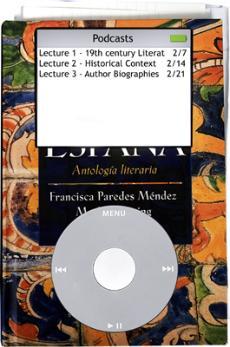
The University prides itself in its ability to offer students exceptional educational programs and the highest technology on the market.
One new technology the University is embracing is the use of podcasting to aid in learning.
Podcasting is a method of distributing content over the Internet that is primarily presented in audio and video format. A podcast may be a recording of a class lecture, news or sports program, political speech, or many other things. “As its name implies, podcasting is focused on content that will play back on mobile devices, such as an iPod or a cell phone,” Hal Meeks, media and mobile technology consultant for the University, said.
Meeks said podcasting can be compared to a daily paper.
“A publisher creates a podcasting ‘feed’ that is basically a text file using a mark up language called XML, which describes each new episode that is published,” Meeks said. Students then use an application such as iTunes to subscribe to that feed, and can then see all the episodes that have been published by their professors.
The Apple iTunes Music Store has a section devoted to podcasts that students can subscribe to free. After students subscribe they can receive lectures, video or some other form of media professors want the students to view.
One benefit of podcasting is students do not have to remember to download each episode professors post because software automatically downloads new episodes as they are published.
Zane Purvis, a master’s student in computer engineering, said he thinks new technology such as podcasting makes it easier and more enjoyable for people to do their jobs, to learn, to teach and to live.
“What makes podcasting really useful is that it is very easy to ‘subscribe’ to a podcast, and whenever there is a new episode available, it will automatically be downloaded onto a subscriber’s computer or portable digital media player,” Purvis said.
Episodes can then be listened to whenever it is convenient to the student.
“Students can listen to their podcast while they are driving to school or work, riding the bus, running around the lake or waiting for a class to start,” Purvis said.
With the popularity of podcasting increasing, people are now able to express themselves in a different form.
“Podcasting is another expression of a larger trend toward self-publication systems in our society,” Meeks said. “Some students may be interested in creating an audio blog or an Internet radio show.”
This is made especially easy by new software that allows users to create their own podcasts.
“Apple recently announced iTunes University to encourage college professors to publish recordings of their lectures so that their students, and possibly others, can listen to the lectures later,” Purvis said.
Although Apple is a big provider of podcasting software, podcasts do not have to be uploaded to an Apple computer or an Apple device such as an iPod. The Apple software iTunes, for example, is available for both Macintosh and Windows operating systems.
There is also other software available for creating podcasts on Macintosh, Windows and Linux computers.
Purvis said students need to become familiar with podcasting and the different software that makes podcasting available to them, even if it’s not just for lectures.
“Students should be interested in podcasting since portable digital music players are becoming more common and having new content automatically downloaded to them can take away the monotony of listening to the same music library day after day, especially if you have a small music selection,” Purvis said.
Meeks pointed out other students who might be interested in creating their own podcast or downloading podcasts onto their personal devices are students for whom English is a second language.
“Students with English as a second language can use audio recording as a way to capture the instructor so they can go over the content later,” Meeks said. Michael Rappa, professor of technology management, is a professor who embraced the use of podcasting as a teaching method, beginning in August 2005.
“The main reason was to provide my distance education students with conversational guides to each course topic,” Rappa said.
Rappa also makes his podcasts available to the public.
“My students are not the only ones who can download and view the podcast. Anyone who visits my distance education site can view them,” Rappa said.
Podcasting at the University, he said, definitely has a bright future.
“Podcasting has become inexpensive and relatively easy for almost any computer user to create and edit audio content and to distribute it on the Web as a podcast,” Rapp said. “Also, audio content has a strong appeal to the typical multi-tasking student.” But for some students, like senior in communication DJ Ritter, podcasting is not limited to speeches from professors.
“Since I am in the Air Force, I feel like I need to use podcasting to automatically download speeches by President [George W.] Bush or other political figureheads so I can keep up with what is going on in the world around me,” Ritter said.